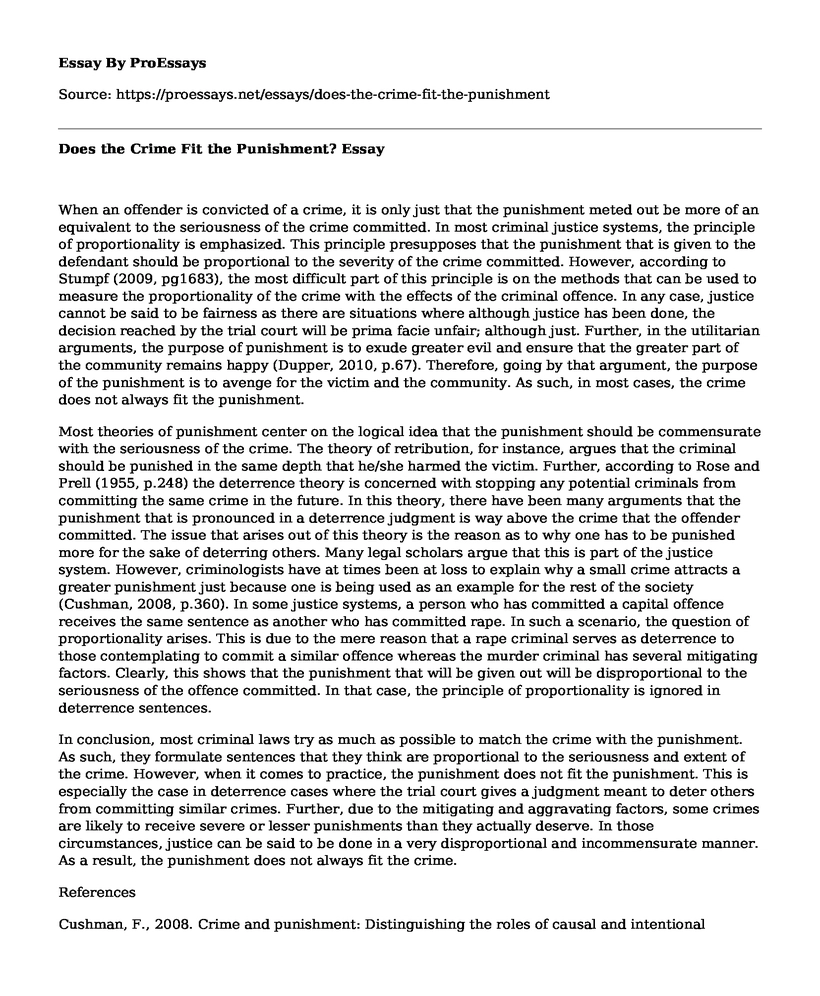When an offender is convicted of a crime, it is only just that the punishment meted out be more of an equivalent to the seriousness of the crime committed. In most criminal justice systems, the principle of proportionality is emphasized. This principle presupposes that the punishment that is given to the defendant should be proportional to the severity of the crime committed. However, according to Stumpf (2009, pg1683), the most difficult part of this principle is on the methods that can be used to measure the proportionality of the crime with the effects of the criminal offence. In any case, justice cannot be said to be fairness as there are situations where although justice has been done, the decision reached by the trial court will be prima facie unfair; although just. Further, in the utilitarian arguments, the purpose of punishment is to exude greater evil and ensure that the greater part of the community remains happy (Dupper, 2010, p.67). Therefore, going by that argument, the purpose of the punishment is to avenge for the victim and the community. As such, in most cases, the crime does not always fit the punishment.
Most theories of punishment center on the logical idea that the punishment should be commensurate with the seriousness of the crime. The theory of retribution, for instance, argues that the criminal should be punished in the same depth that he/she harmed the victim. Further, according to Rose and Prell (1955, p.248) the deterrence theory is concerned with stopping any potential criminals from committing the same crime in the future. In this theory, there have been many arguments that the punishment that is pronounced in a deterrence judgment is way above the crime that the offender committed. The issue that arises out of this theory is the reason as to why one has to be punished more for the sake of deterring others. Many legal scholars argue that this is part of the justice system. However, criminologists have at times been at loss to explain why a small crime attracts a greater punishment just because one is being used as an example for the rest of the society (Cushman, 2008, p.360). In some justice systems, a person who has committed a capital offence receives the same sentence as another who has committed rape. In such a scenario, the question of proportionality arises. This is due to the mere reason that a rape criminal serves as deterrence to those contemplating to commit a similar offence whereas the murder criminal has several mitigating factors. Clearly, this shows that the punishment that will be given out will be disproportional to the seriousness of the offence committed. In that case, the principle of proportionality is ignored in deterrence sentences.
In conclusion, most criminal laws try as much as possible to match the crime with the punishment. As such, they formulate sentences that they think are proportional to the seriousness and extent of the crime. However, when it comes to practice, the punishment does not fit the punishment. This is especially the case in deterrence cases where the trial court gives a judgment meant to deter others from committing similar crimes. Further, due to the mitigating and aggravating factors, some crimes are likely to receive severe or lesser punishments than they actually deserve. In those circumstances, justice can be said to be done in a very disproportional and incommensurate manner. As a result, the punishment does not always fit the crime.
References
Cushman, F., 2008. Crime and punishment: Distinguishing the roles of causal and intentional analyses in moral judgment. Cognition, 108(2), pp.353-380.
Dupper, D.R., 2010. Does the punishment fit the crime? The impact of zero tolerance disciphne on at-risk youths. Social Work in Education, 32(2), pp.67-69.
Rose, A.M. and Prell, A.E., 1955. Does the punishment fit the crime? A study in social valuation. American Journal of Sociology, pp.247-259.
Stumpf, J., 2009. Fitting punishment. Wash. & Lee L. Rev., 66, p.1683.
Cite this page
Does the Crime Fit the Punishment?. (2021, Mar 03). Retrieved from https://proessays.net/essays/does-the-crime-fit-the-punishment
If you are the original author of this essay and no longer wish to have it published on the ProEssays website, please click below to request its removal:
- Analysis of Cases
- Cognitive Behavior Therapy in Social Work Essay
- National Security and Online Privacy Dilemma With Annotated Bibliography
- Literature Review on Growth vs. Fixed Mindset
- Essay Example on Truth in Social Sciences: A Critical Analysis
- Essay on Mental Health Disorders in Kids and Adults: What You Need to Know
- New York City: A Vibrant and Busy Metropolis - Essay Sample







